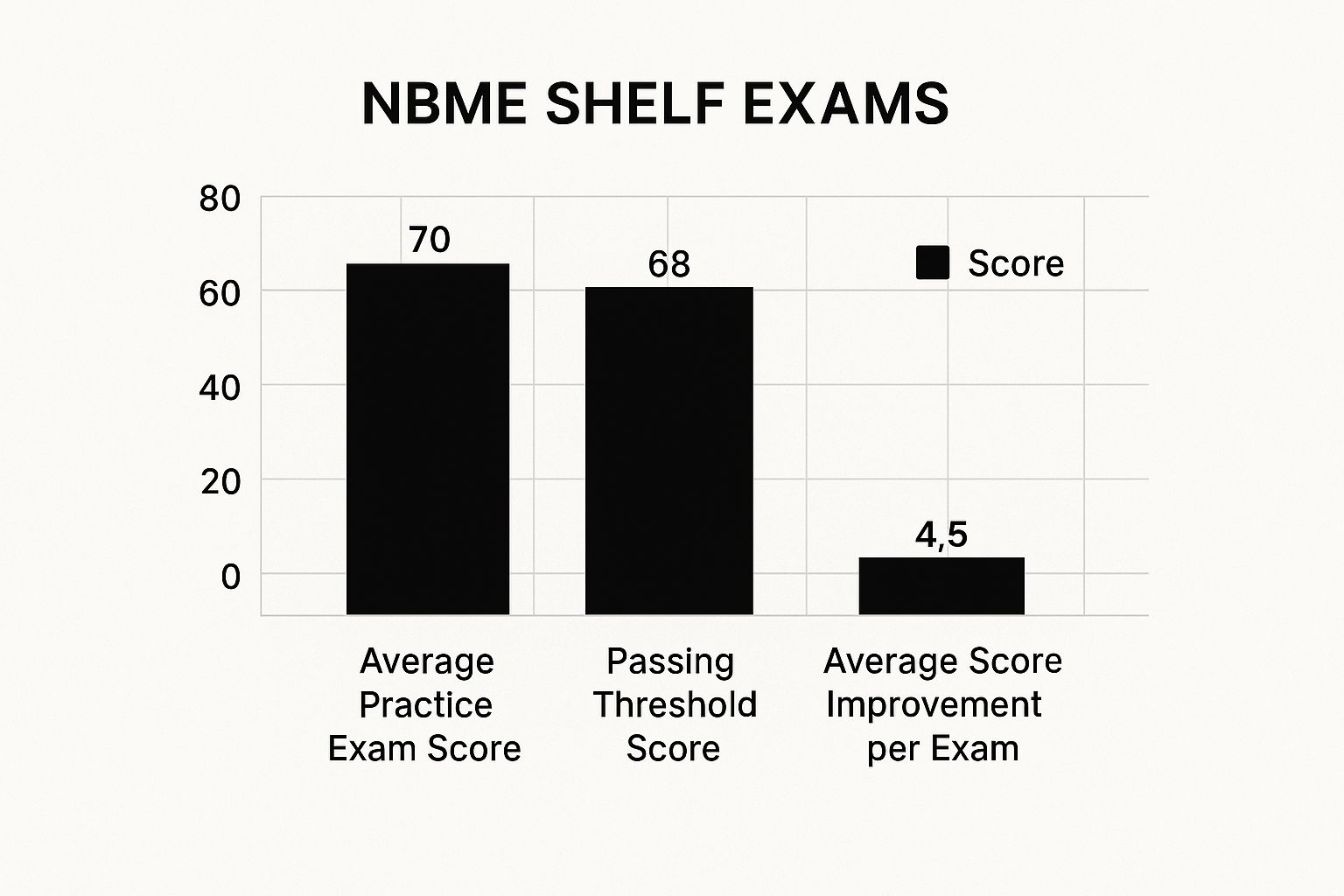The NBME shelf practice exams are, without a doubt, the single best training tool you have for mastering clinical knowledge and predicting how you'll perform on the USMLE Step 2 CK. Think of them as standardized, subject-specific tests that go beyond a simple pass/fail grade to show you where you stand against your peers nationwide.
Why Shelf Exams Are More Than Just Another Test

Let's be real—the last thing you want during a grueling clinical clerkship is another standardized test. I get it. But NBME shelf exams are a different beast entirely. They play a dual role, acting as both a final assessment for your rotation and a seriously powerful prep resource for the boards.
Each shelf exam is like a real-time audit of your clinical knowledge. It validates what you're actually learning on demanding rotations like Internal Medicine or Surgery, giving you a concrete measure of what's sticking. This isn't just about getting through a course; it's about building the unshakable foundation you'll rely on for your entire career.
A Benchmark for Clinical Competence
The National Board of Medical Examiners (NBME), founded way back in 1915, has long been the gold standard in medical assessment. Its NBME shelf practice exams are meticulously designed to gauge your knowledge and readiness to move forward.
What makes them so valuable is the national comparison. These exams give you a crystal-clear benchmark against your peers across the country. It’s the ultimate reality check that answers the critical question: "Do I really know this material as well as I should at this stage?"
A strong performance builds incredible confidence. A weaker one? It pinpoints specific knowledge gaps you can fix long before you're sitting for the high-stakes USMLE Step 2 CK.
Key Takeaway: Stop seeing shelf exams as a hurdle and start seeing them as a diagnostic tool. Your performance is a direct reflection of your grasp of core clinical subjects, offering an invaluable chance to shore up your knowledge base.
The Foundation for Future Success
It's no secret in the medical community: strong performance on shelf exams consistently correlates with higher scores on Step 2 CK. This isn't a coincidence. The content, question style, and clinical vignettes on shelf exams are designed to mirror what you'll face on your board exams.
When you master the content for each rotation-specific shelf, you're essentially building a powerful repository of knowledge you can draw on for Step 2 CK. Excelling in these exams does more than just teach you facts; it develops essential test-taking stamina and hones your clinical reasoning skills under pressure. They are, quite simply, your most effective training ground for both licensure and confident, day-one practice as a resident.
What Your Shelf Score Really Means for Step 2
You just got your score back from the latest NBME shelf practice exam. But what does that three-digit number actually tell you about your future? It's so much more than just a piece of your clerkship grade—it's one of the most reliable predictors of how ready you are for the high-stakes USMLE Step 2 CK.
Think of each shelf exam as a full-dress rehearsal. The question style, the timing, the pressure… it's all designed to mimic the real deal. This gives you an incredible chance to fine-tune your test-taking strategies long before the score actually defines your future. It's not about just getting a high number; it's about using the data from every single NBME shelf practice exam to find and fix your weak spots.
From Clerkship Grades to Step 2 Readiness
The link between strong shelf scores and great Step 2 CK outcomes is no secret. The data consistently shows a powerful positive trend: students who do well on their shelves are far more likely to pass, and often crush, Step 2 CK.
Just look at the numbers. For the 2021-2022 cycle, the first-time pass rate for MDs was 98%. This is a direct reflection of how well the curriculum—and its continuous assessments like shelf exams—prepares students for this marathon exam. You can dig into more performance data on the USMLE website to see these trends for yourself.
This is exactly why treating every shelf exam with the seriousness it deserves is one of the best investments you can make in your medical career. It builds the solid foundation you need, much like the one you built for Step 1. If you want to brush up on those foundational study skills, our guide on how to study for USMLE Step 1 is a great place to start.
A common mistake is seeing a single shelf score in a vacuum. A better approach is to view it as one point on a larger trend line. One bad score isn't a disaster, but a pattern of poor performance is a clear signal that you need to rethink your study habits.
How to Use Your Performance Report
Your score report is a gold mine of information, so don't just glance at the final number and move on. You need to dig into the topic breakdown and see exactly where you stumbled.
Did cardiology questions on your medicine shelf trip you up? Or maybe you were shaky on developmental milestones during your pediatrics rotation?
Use this specific feedback to steer your studying for the next clerkship. By proactively tackling the weaknesses revealed by your NBME shelf practice exams, you transform a simple score into a powerful, actionable plan for acing your next exam and, ultimately, Step 2 CK.
Building a Study Plan That Actually Works With Rotations

Let's be honest: a rigid, hour-by-hour study schedule is a fantasy that will completely fall apart the moment you step onto the wards. Clinical rotations are pure chaos. Your study plan needs to be just as flexible to survive without leading to total burnout. The real secret isn't cramming; it's building sustainable habits.
Forget the idea of saving all your studying for the end of a long day when you're completely drained. The game-changer is learning to grab those small, unexpected pockets of downtime.
Picture this: you're on a surgery rotation with a 20-minute gap between cases. That's a golden opportunity to whip out your phone and knock out 10 Qbank questions. Or maybe it's a slow afternoon on internal medicine. Perfect time to review high-yield topics related to a patient you just saw.
This approach transforms studying from a massive, dreaded task into something you chip away at constantly. It's about being smarter with your time, not just working harder.
Adapting Your Approach for Each Rotation
Every single rotation is its own beast, and your study plan needs to change with it. A one-size-fits-all strategy will leave you painfully unprepared for the unique challenges of each shelf exam. You have to pivot your focus based on the rotation's content, pace, and expectations.
Here’s how you might adjust your game plan:
- Pediatrics vs. Psychiatry: For Peds, your brain will be stuffed with developmental milestones and vaccination schedules. Then, for Psych, you'll switch gears completely to DSM-5 criteria and the nuances of pharmacology side effects. Your study resources and how you practice active recall have to change to match.
- Surgery vs. Internal Medicine: Your surgery shelf prep will be laser-focused on anatomy and post-op complications. For Internal Medicine, the scope is massive, demanding a strong grasp of diagnostic algorithms and management plans for a huge range of conditions.
The students who truly crush their rotations are the ones who connect their clinical experience directly to their prep for NBME shelf practice exams. Saw a patient with pancreatitis? Spend ten minutes that evening drilling the associated Qbank questions. This cements the knowledge in a way that just reading a textbook never will.
Your performance on these exams has a direct impact on your final evaluation. Research consistently shows a strong link between shelf scores and clerkship outcomes. In fact, one study of 312 students found that the order of clerkships and previous exam performance were major factors in shelf scores. You can dig into the data on how clerkship factors influence exam results.
By deliberately aligning what you see on the wards with the topics on the shelf, you create a powerful cycle of reinforcement. It's a method that will boost not only your grade but your confidence as a clinician.
Choosing Your Shelf Exam Study Arsenal
Walking into the world of shelf exam prep can feel like stepping into an overwhelming library. With so many resources screaming for your attention, how do you pick the right ones? The key isn't to use everything, but to build a smart, targeted arsenal for your NBME shelf practice exams.
Success comes from understanding one core principle: different resources have different jobs. You need tools for learning and separate tools for assessment.
The Learning vs. Assessment Mindset
Think of it this way: question banks (Qbanks) like UWorld and Amboss are your primary learning tools. These are your daily drivers. The questions are often intentionally more complex than what you'll see on the actual exam, and their detailed explanations are designed to teach you clinical concepts from the ground up. You should be living in these throughout your rotation to build that solid foundation of knowledge.
On the other hand, the official NBME Clinical Mastery Series (CMS) forms are pure assessment tools. These are collections of retired shelf exam questions, making them the most authentic preview of test day you can get. Their purpose isn’t to teach you new things, but to give you an honest look at where you stand. They're perfect for measuring your knowledge and getting a feel for the exam's unique style.
Weaving Your Resources Together
A common pitfall is using these tools for the wrong purpose. If you only use CMS forms to study, you'll have massive knowledge gaps. But if you only use UWorld, you might be blindsided by the specific flavor and scope of the real shelf exam questions.
The winning strategy is to layer these resources intelligently. Spend the majority of your rotation grinding through your chosen Qbank, mastering the material day by day. Then, about one to two weeks before your exam, switch gears and take a couple of NBME practice exams. This gives you a final, accurate assessment of your readiness and helps you fine-tune your test-taking strategy.
This chart shows just how much of a difference a structured approach can make.

As you can see, targeted practice leads to real, measurable improvements. It’s not just about putting in the hours; it’s about making those hours count.
Think of your Qbank as your daily workout and the CMS forms as your dress rehearsal before the big show. Integrating them this way, rather than just completing them, is what truly pushes your score to the next level.
For an even more detailed breakdown of building a high-impact study plan, check out our complete guide on how to study for shelf exams. It’s packed with more of these actionable strategies.
Costly Mistakes Students Make During Shelf Prep
It’s a classic med student paradox: you're busier than ever on rotations, but your learning feels stagnant. Many hardworking students fall into the same common traps that end up sabotaging their scores on NBME shelf practice exams and, ultimately, the real deal.
One of the biggest culprits I see is passive learning. It's so easy to just watch a video lecture or skim a textbook chapter and feel like you've accomplished something. But this creates an illusion of studying without the active recall that actually cements knowledge in your brain. You might feel productive, but that information just isn't sticking.
Another huge mistake is not digging deep into your incorrect answers on Qbanks. A quick glance at the right answer isn't nearly enough. You have to understand why your choice was wrong and, just as importantly, why the correct answer was the best choice. This kind of deep analysis is where the most valuable learning happens.
Avoiding Burnout and Ineffective Habits
Let's be clear: protecting your well-being during clerkships is just as critical as your study method. If you start ignoring sleep and proper nutrition, your cognitive performance will plummet. At that point, it doesn't matter how many hours you clock in—you simply won't be able to learn effectively.
Don't confuse hours clocked with knowledge gained. High-scoring students focus on the quality of their study sessions, not just the quantity. Active, focused learning for a shorter period is far more effective than hours of passive review.
Here are a few of the most common pitfalls you absolutely need to avoid:
- Neglecting a schedule: Without a solid plan, it’s far too easy to fall behind. This almost always leads to panicked, last-minute cramming, which we all know is a recipe for disaster.
- Resource overload: Drowning yourself in too many resources is a classic mistake. It leads to shallow learning across all of them instead of mastery of any single one. Pick a few high-quality tools and learn them inside and out.
- Ignoring weaknesses: It’s comfortable to review topics you already know well, but real progress only comes from confronting the subjects that give you trouble.
By recognizing these common mistakes, you can sidestep them and build much more effective habits. For an even deeper look at building a winning study routine, check out our comprehensive collection of medical exam study tips.
Your Questions on NBME Shelf Exams Answered

As you dive into the demanding world of clinical rotations, you'll find that specific, practical questions about shelf exams pop up constantly. Getting clear, actionable answers can make a huge difference in your confidence—and, more importantly, your final score. Let's tackle some of the most common questions I hear from students about using NBME shelf practice exams.
One of the first things students ask is about volume. Just how many practice tests are enough? While there's no single magic number, a strategy that works wonders is taking 2-3 official NBME Clinical Mastery Series (CMS) forms for each clerkship. This approach lets you set a baseline, check in on your progress mid-rotation, and do a final knowledge check about a week before the real thing.
But taking the tests is only half the battle. Another major point of confusion is how to actually use the results. It's so easy to fixate on that three-digit score, but the real gold is in the percentage correct and, most critically, your performance trends over time.
Understanding Your Performance
So, what’s a "good" score on an NBME practice test? It’s a natural question to ask. A solid benchmark to aim for is scoring at or above the national average for that specific form. From my experience, a score of 75% or higher usually means you’re in a great position to pass and are even knocking on the door of honoring the shelf.
But please, remember this: a practice test is a diagnostic tool, not a final verdict. Your scores will fluctuate. That's completely normal. A single lower-than-expected score isn’t a signal to panic; it’s a bright, flashing arrow pointing you toward specific knowledge gaps you can fill before test day.
A critical mistake is treating practice exams as simple pass/fail indicators. Instead, view them as detailed roadmaps to your weaknesses. The goal is to learn from every single question, especially the ones you get wrong.
UWorld vs The Real Shelf Exam
I get this question all the time: "Are UWorld questions harder than the actual shelf exams?" The overwhelming consensus from students I've worked with is a resounding "yes"—and that’s by design. UWorld is fundamentally a learning tool, built to drill deep clinical knowledge with its signature complex, multi-step questions.
The NBME shelf practice exams, on the other hand, are assessment tools, just like the real shelf. They test your ability to apply what you know to more direct clinical vignettes. The best strategy is to lean on UWorld for learning throughout your rotation and then pivot to the NBME forms for assessment as your exam date gets closer. This two-pronged approach ensures you’re both building a rock-solid knowledge base and getting dialed in for the specific style of the test.
Feeling overwhelmed by your shelf exam prep or not seeing the score improvements you want? The expert tutors at Ace Med Boards provide personalized, one-on-one guidance to help you master high-yield topics and develop effective test-taking strategies. Schedule your free consultation today!

